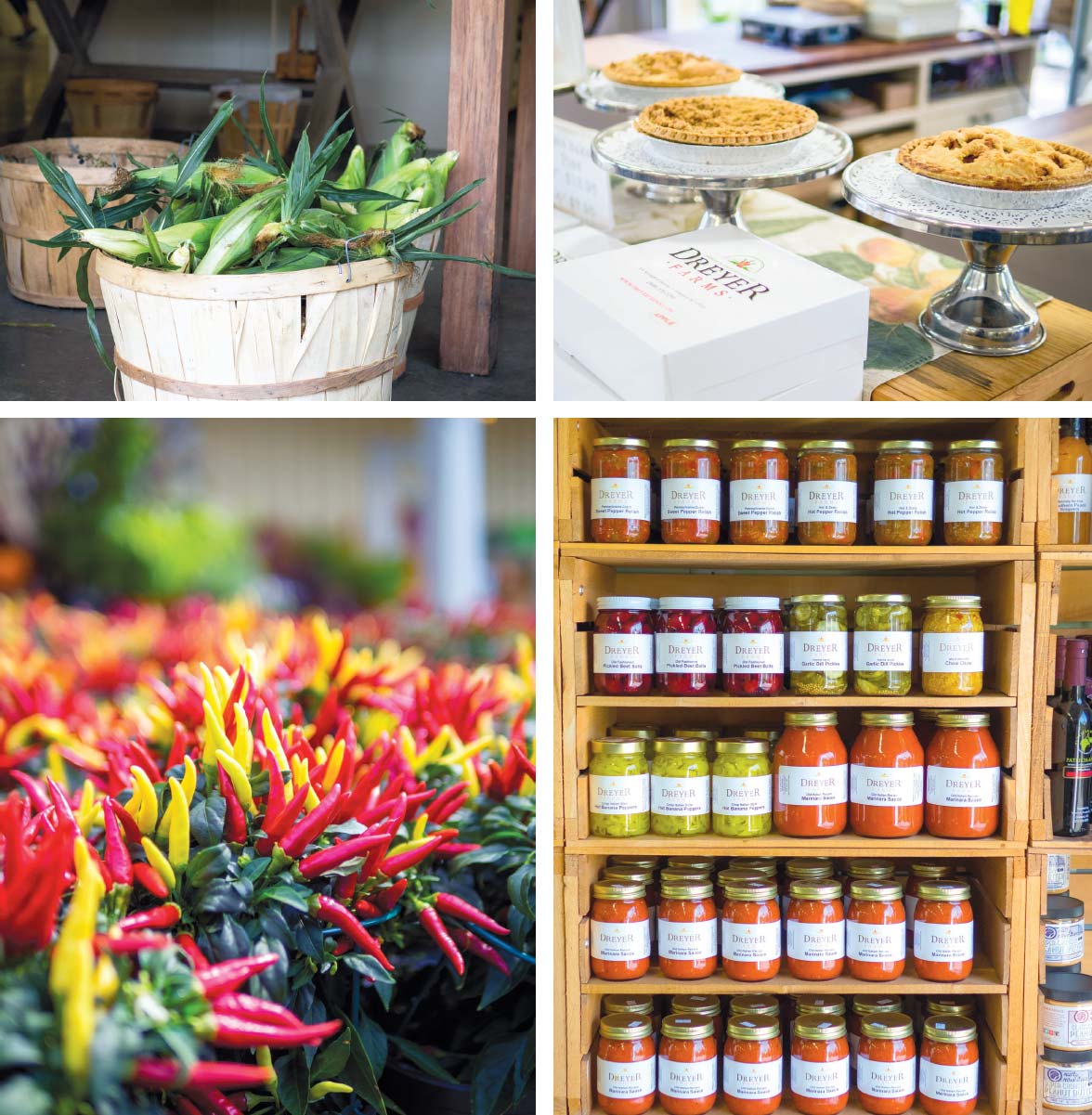Family Heirlooms: The Next Generation of Dreyer Farmers
The next generation of Dreyer farmers
To imagine a neighborhood farm is to conjure up a countryside with hayfields and long dirt driveways and a little white house where the farmer lives. But in the town of Cranford, as any student of Union County College or jogger in Nomahegan Park will tell you, it is to reimagine a farm in a literal neighborhood. The driveways are paved, the lawns are mowed and, despite the frequent rumble of pickup trucks loaded with sweet corn and tomatoes, the view is decidedly suburban.
Surrounded on three sides by backyard patios, pools and trampolines, a well-rooted field of Pink Brandywines stands in stark contrast to everything outside its box wire enclosure. Under one of many Dreyer Farms baseball caps bobbing up and down between rows one summer morning is Jessica Dreyer, the great-granddaughter of the farm’s original owner. A past president of the Union County Board of Agriculture, member of Gov. Murphy’s Agriculture Transition Team and graduate of the University of Massachusetts Plant and Soil Science program, today she is one of many sets of hands restocking the farm market for the Sunday rush.
Throughout the growing season, 40 different tomatoes will cycle through the market shelves, while 150 varieties of seedlings will find their way from Dreyer Farms’ 12 greenhouses to the hands of customers who prefer to grow their own. Many of the varieties are heirlooms, and all of them are hand-picked from 15 seed catalogs that Jessica and her father, John, review each year, and then weigh against the performance of last year’s varieties.
“There’s a story for each one,” says the elder Dreyer, pointing out a full-grown plant sagging with giant yellow tomatoes. “A big tomato with a story—that’s what you call an heirloom.”
Kale, zucchini, radishes, carrots, beets, Swiss chard, scallions, garlic, eggplant, carrots and blackberries grow alongside the tomatoes in the 6-acre patchwork of modern Cranford farmland that still bears his grandfather’s name. But, the story of the Pineapple Pig tomato begins at a farm in California, where it was bred from century-old plants and packaged for sale as “Sweet, Late and Worth the Wait.” It continues on a century-old farm in Union County when a lucky CSA subscriber gets to taste-test that claim.
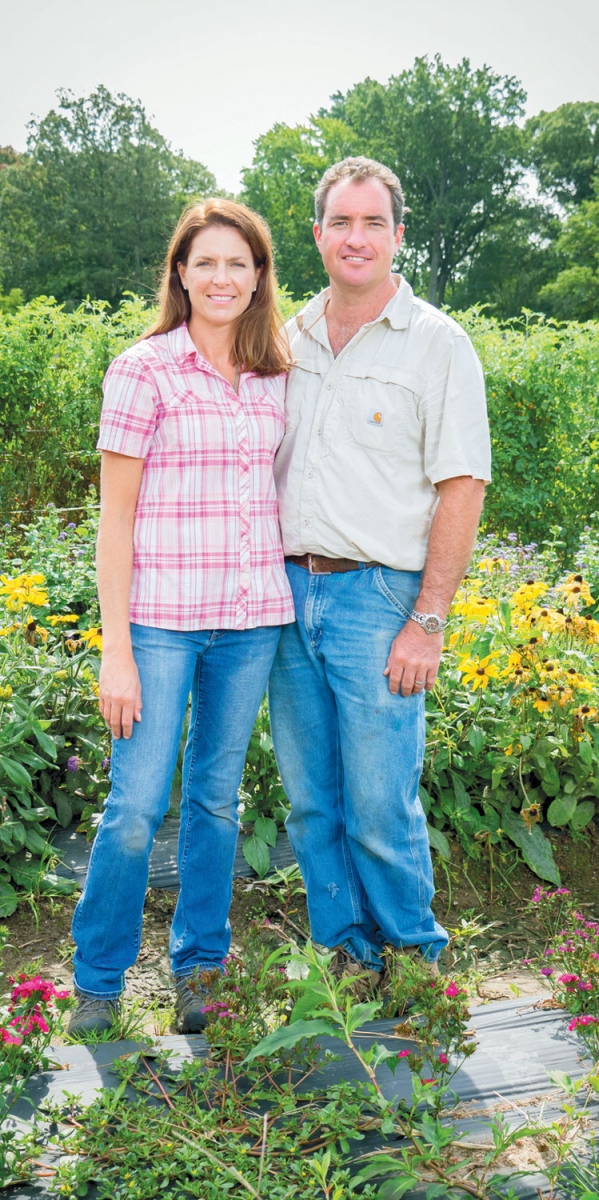
Wife-and-husband farmers Jessica Dreyer and Adam Costello
“You can’t just have vegetables anymore. [Customers] want to know you know everybody who grew them.” —Jessica Dreyer
So, too, goes the story with almost every item in the Dreyer market, even the bread, milk, cheese, poultry, fruit and vegetables sourced from other farms. “Most of the other growers we work with, we know,” says the younger Dreyer, a curator of Jersey Fresh produce who has grown her family’s modest three-garage farm stand into a bustling market and one-stop-shop for locavores and gourmets alike. Her customers’ appetite for stories rivals even their appetite for Siberian kale—and she is no stranger to in-depth questions at the checkout counter. “You can’t just have vegetables anymore,” she adds with a little laugh. “They want to know you know everybody who grew them.”
Inside, the close marriage of farm and market is on display everywhere: in heads of Donaldson Farms cabbage piled up in bins, in a refrigerator case stocked with Griggstown Farm poultry—but it finds its most literal expression whenever a fresh delivery of Wightman Farms sweet corn rolls up in a truck outside. The driver is Adam Costello, who is Jessica Dreyer’s husband and owner of Wightman’s.
Together, the couple grows 40% of the produce that leaves the Dreyer Farms market in grocery bags and CSA boxes, which includes Wightman peppers, peaches and raspberries. In his own market in Morristown, Costello sells Dreyer’s potted plants and herbs alongside his farm’s ever-widening selection of fruits and vegetables. Here too, the Pineapple Pig philosophy rules, and he has recently begun experimenting with artichokes and Evercrisp apples, a cross between Honeycrisp and Fuji.
Among other bets that turned out particularly well was one the couple made 18 years ago at the suggestion of a mutual friend, who thought it would be funny to convince two farmers to go out on a blind date. “There aren’t too many in this part of the state,” says Costello, ostensibly referring to farmers in general. “Finally, I met someone who understood what I was talking about.”
Eleven years later, their 5-year-old son, Ethan, would broker another meeting, this one between his mother and the mother of a kindergarten friend, who would soon join the Dreyer “farmily” with a new idea. Now the director of the farm’s wildly popular CSA, Dawn Salerno started the program from scratch and turned it into an 800-member-strong community of creative eaters—who will this year reap the benefits of her recent certification as a health coach with the Institute for Integrative Nutrition.
“I can’t tell you how many people I’ve turned on to radishes,” Salerno says, describing her latest offering: the weekly BAM Box, a fruit-focused sampler designed for skeptics, which comes with two veggies and a simple recipe. Something as easy as roasting, she points out, can transform a radish into an entirely different vegetable. “People have their set handful of things they cook over and over because they just don’t have time for anything else. Success is getting those people excited about vegetables.”
- 1904:
Gustav Dreyer buys his first piece of farmland in Cranford- 1946:
Gustav’s son Henry inherits the family farm, and his wife, Henrietta, opens the original Dreyer farm stand to sell produce- 1971:
Henry and Henrietta’s sons John and Henry add greenhouses to grow annuals, perennials and vegetable seedlings- 1998:
John’s daughter Jessica becomes a full-time farmer, adding a CSA and new market- 2014:
Dreyer farm market opens, selling Wightman’s peaches, corn and other Jersey Fresh produce- 2018:
Jessica’s daughter Lily, 10, learns the cash register from older brother Ethan
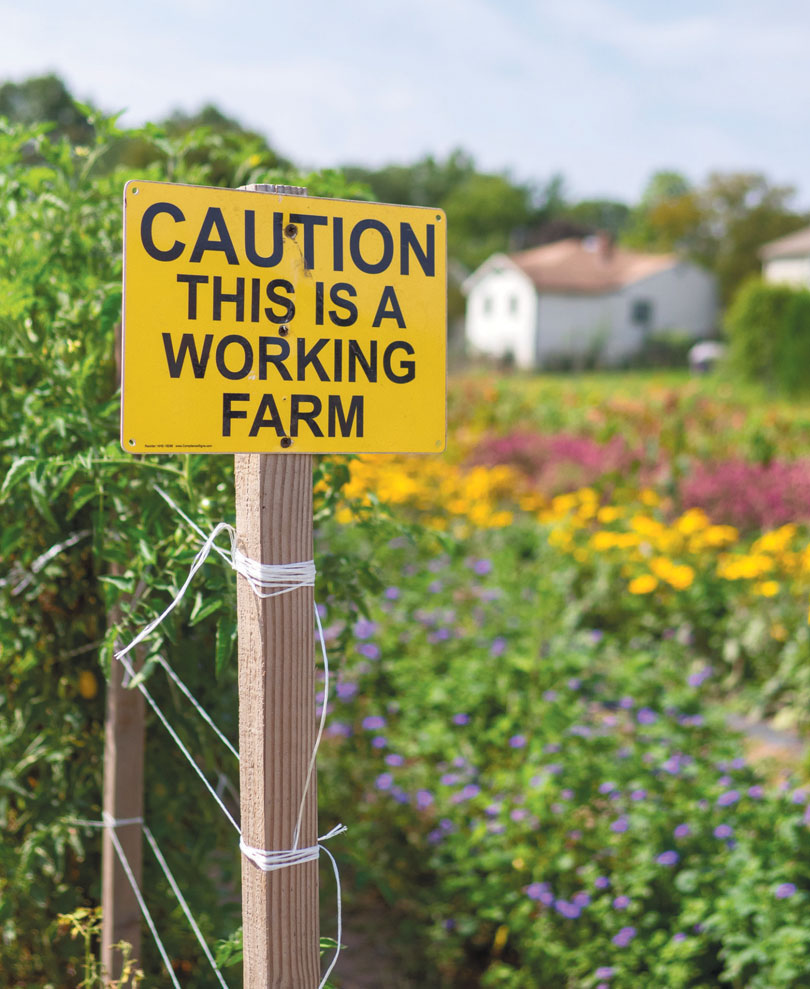
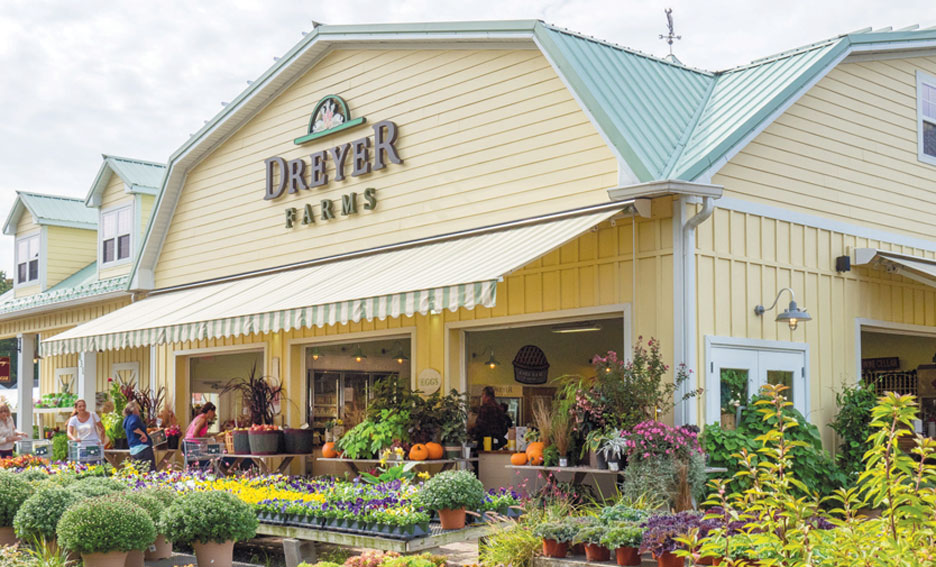
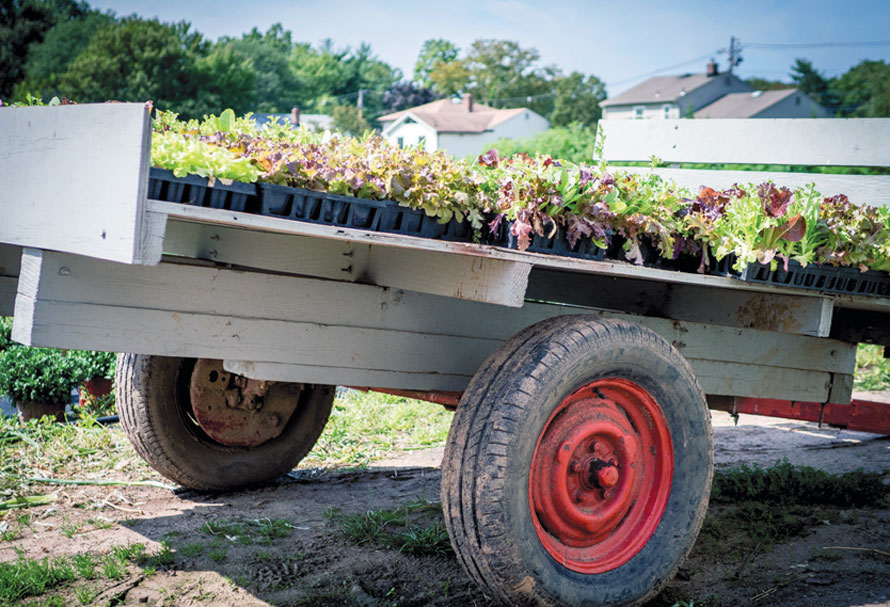
Full and half shares of Dreyer’s standard-size offerings often include a “prize inside,” in the form of other, non-produce items sold throughout the market, like pizza dough, cheeses, bread and even gourmet meatballs. “Everything in there is made by one person,” says the younger Dreyer, referring not only to the contents of the CSA boxes, but to everything sold in the farm market. “There’s the bread lady, the spice guy, the meatball man, the local mozzarella, eggs, ice cream, honey, maple syrup . . . we could never have fit it all in the garages.”
If there is a difference between a farm market and the Dreyer family’s 3-garage farm stand that it replaced in 2014, it is the presence of other local businesses on the shelves, which are not in competition with the farm’s produce, but which benefit from the added exposure to similar customers. One such vendor, Vanilla Bean Creamery, returns the favor each fall, when it makes a special crossover flavor in its downtown Cranford storefront, “Dreyer Farms Apple Cider Donut Ice Cream.”
Across from the registers at the front of Dreyer Farms market is a line of refrigerator cases, the oldest of which holds special significance— not only because the milk inside came from Springhouse Creamery, a first-generation dairy in Fredon run by another father- daughter pair, but also because this was the refrigerator that marked the end of the stand era and the beginning of the market.
“I don’t want to turn into a 7-Eleven,” the elder Dreyer once said, a statement for which he is still teased by the younger. If not the sprawling nursery, the massive assortment of flowers, herbs, annuals and perennials that fill the greenhouses and line the front entrance, then the tiny layer of cream that forms at the top of the glass bottles in the case, proof positive that the Dreyer Farms market is anything but homogenized.
“You have to have a changing story,” Jessica says, remembering the not-so-far-gone days when her late grandmother, Henrietta, still calculated sales tax on the back of paper bags. Henrietta had grown up on a pansy farm in nearby Springfield and met her husband, Henry Dreyer, while working as a schoolteacher—before opening the original farm stand in 1946. Even then it was a kind of hybrid business, selling both her family’s pansies and perennials and Henry’s vegetables and produce.
During the 114 years since Henry’s father, Gustav, bought the family’s first piece of land in 1904, Dreyer farm grew to 240 acres, and though it has since shrunk down to only 6, at some point it also gained an ‘s.’ To what that letter now refers perhaps depends on whom you ask, but Jessica Dreyer calls Wightman’s “our other farm,” and invites the 55 businesses represented on her market’s shelves to an annual ‘vendor night,’ during which CSA members can take the locavore mantra “know your farmer” to the next level.
For those who arrive at the market by chance, via a Sunday drive or a scroll through Facebook, the introduction is made by Justine Gray, another Dreyer farmer who teaches the next generation of growers and eaters about farming and the environment— even before many of them have learned to eat their vegetables. Her students range from Brownie troops to local politicians, aspiring gardeners to master chefs; her venue is equal-parts working greenhouse, 3rd-grade classroom, NJ Farm Bureau meeting and environmental fair.
“Everybody comes here to start their own little farm,” she says. On paper, she manages the farm’s social media and writes its newsletter, but in practice, Gray, like everyone else at Dreyer’s, is equally likely to drop everything to help a new customer find the right tomato. “We all work here for fun.”
After a moment of reflection, Jessica Dreyer, the fourth-generation farmer of what might have easily eroded into a 6-acre island in suburbia, decides to open up a few more spots for Yoga in the Field, a new program in which an instructor teaches poses from atop a trailer hooked to a tractor.
“I think people pick up on that.”
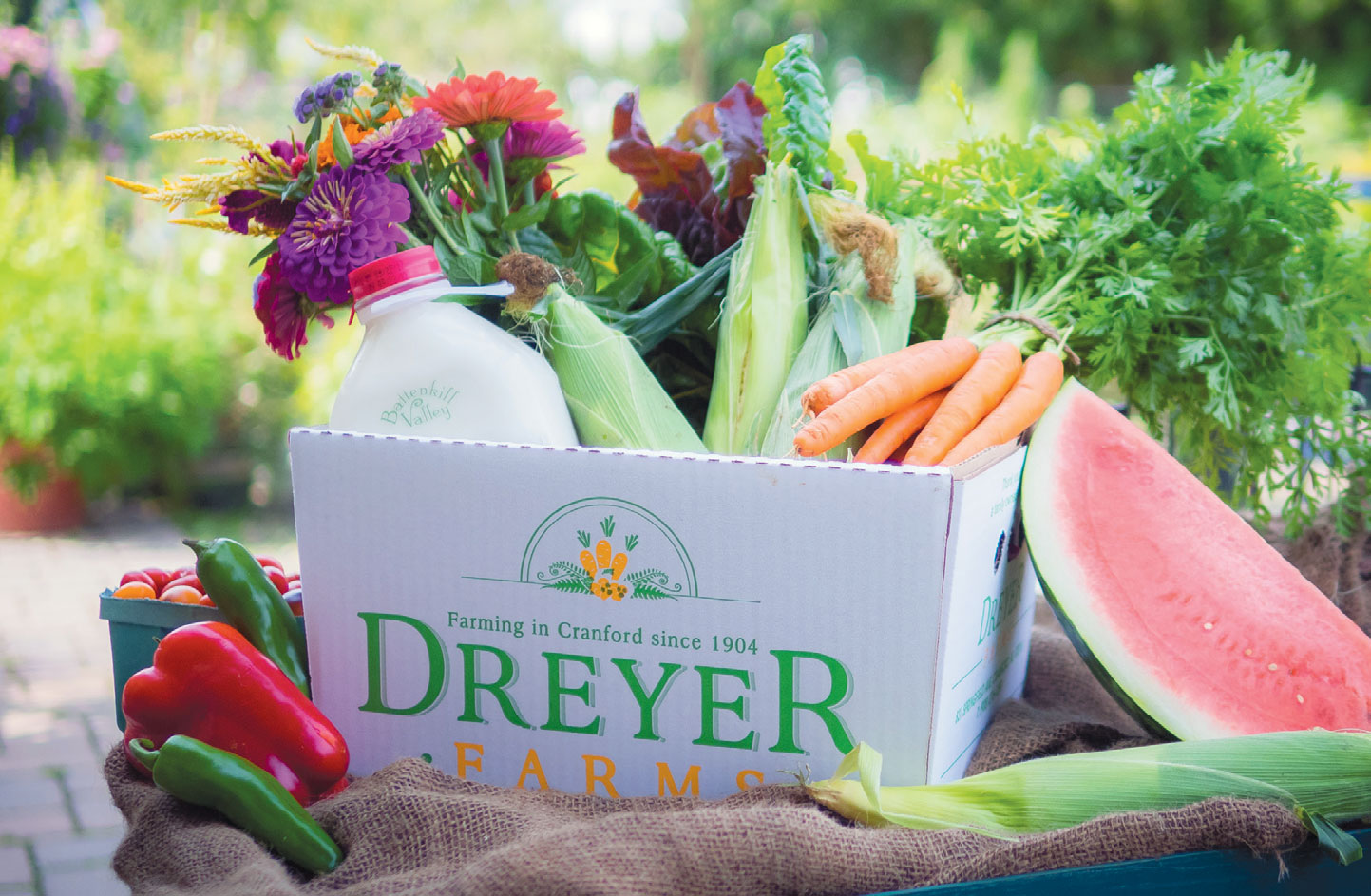
DREYER FARMS
831 Springfield Ave.
Cranford
908.276.1290
dreyerfarms.com
Hours: Monday–Saturday: 8am–6pm; Sunday: 8am–5pm


